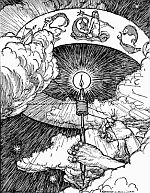 There is a received dogma within our culture that says using labels to define who you are either politically, religiously, or any other way, is divisive and arrogant. Instead we should just amorphously state our opinions on various subjects instead of using these labels that cause divisions and splits within groups or communities. My generation (and younger) seems to have accepted this as the way things are. You just don’t use labels as much as possible. It is impolite at best and instigating hate at the worst.
There is a received dogma within our culture that says using labels to define who you are either politically, religiously, or any other way, is divisive and arrogant. Instead we should just amorphously state our opinions on various subjects instead of using these labels that cause divisions and splits within groups or communities. My generation (and younger) seems to have accepted this as the way things are. You just don’t use labels as much as possible. It is impolite at best and instigating hate at the worst.
Unfortunately, that thinking has seeped into the church to large degree to where we just don’t use labels to define what we believe anymore. We’re all just generally “Christians,” without walls, without denominational barriers, all one in Christ. Now there is some truth to that (and hope for unification somewhere down the road), for some of the denominations out there. Yet for other denominations, there have historically been splits from these groups over truth itself, over the Gospel, not just over church floor color and various subjective arrangements.
On MySpace it seems popular to put “Christian – Other,” that way others have to decide what you are, but you surely won’t be pidgin-holed by a label! You can also see this come out on the site GodTube.com as well. You have a whole range of people from various denominations, some groups of which aren’t even considered historic Christians to begin with (you know, those denying the Trinity, the full deity and full humanity of Christ, etc), coming together as one group of people under the label “Christian,” all assuming they together adhere to the same faith, when the reality is there couldn’t be more of a contrast between different groups. But the waters get muddy when there are no labels or definitions of where people are coming from in their faith.
There is something to be said about unity within the church. We need it, and within the Protestant world in particular, there is far too little unity. This is something I actually commend the Roman Catholic Church for: their unity, despite its falsehood. I desire for the day when Protestants can once again stand in unity on the Gospel and the truths of Scripture. Splits over subjective things is dead wrong. Yet splits over truth and what the Scriptures have asserted as the Gospel should be commended instead of chastised. Unfortunately, within the Protestant realm, there is a ton of poisonous theology being put forward as truth which is so far from the truth of the Scriptures.
Our culture says doctrinal truth claims are not important and we need to come together in the name of unity. In fact, our culture says any truth claims are arrogant and divisive, breaking up our humanity. How is it the church of Jesus Christ seems to think this is okay and should be propagated even? I hear this frequently from people at church as well as your average run-of-the-mill Christian out in the world.
Jesus prayed on our behalf in His High Priestly prayer in John 17:17, “Sanctify them in the truth; your word is truth.” He also said in John 14:6, “I am the way, and the truth, and the life. No one comes to the Father except through me.” Jesus is very clear and makes straight forward truth-claims. Maybe we should as well, coming from Scripture of course, instead of giving people no understanding of what it is we believe specifically? Paul made clear in several letters that his readers adhere to correct and truthful doctrine and teaching, and that there be no divisions on these things. That is the kind of division he wanted to keep from happening.
So why do I use labels to define what I believe? Well, for one, because within a label (or word, really) consists a definition, an article of belief, a statement about what the truth is from the Scriptures. Secondly, I use labels because they distinguish my beliefs against other beliefs. Don’t take this as me saying, “I’m better than those who don’t use labels,” or that I in any way look down my nose at those who choose not to use a label. Using labels in no way adds to or takes away from any righteousness we have, because in ourselves, we have none to begin with (total depravity?). Rather our righteousness comes from that which was obtained on our behalf by Christ. Regardless, I am making a recommendation that we do start using labels again to define where it is we are coming from.
Using labels refines what it is you are saying to people about what it is you believe. In all reality though, on a Facebook profile, it doesn’t matter all that much really to use specific labels for your religious beliefs. I just prefer to so maybe someone might investigate further as to what I mean and hopefully I can share the Gospel. However, I do think how we define ourselves in general can be indicative of underlying assumptions about how we personally perceive labels and belief terms themselves. I do feel it is important to be as specific and accurate as possible with your stated beliefs (in any forum or social environment) instead of leaving people with a fuzzy, amorphous understanding of where you are coming from. But that’s just an opinion as it pertains to Myspace or Facebook or any other online social forum.
So why do I use the labels “Christian – Protestant – Evangelical – Reformed” on my Facebook profile? Because each says something about my beliefs against other beliefs. Each says something that further and further distinguishes what I believe concerning “the faith once for all delivered.” I’m going to go through and explain each label and give short, personal definitions within each of the terms:
I’m a Christian as opposed to a Muslim, Hindu or Buddhist:
To just say I’m a “Christian” (while that is obviously true) is way too broad nowadays in our culture. Many will say, “I follow Christ.” Well, a lot of people say that who don’t according to the Scriptures. Many people call themselves “Christian” who according to the Scriptures, have rejected Christ as Savior. Not everyone assumes that when you say, “I believe in Jesus,” that you actually mean you believe in Him alone, that He died for your sins and rose from the dead on your behalf and that you contributed nothing to your salvation.
You must be specific in our culture about your beliefs. You cannot just assume people know where you are coming from as it pertains to the Gospel and Christianity in general. Over in Iran, it may not be as broad to say I’m a Christian. That is a different culture though. But in the thinking of the West, the term Christian encompasses a whole range of beliefs, some of which are fundamentally contradictory to others even. People who are Mormon consider themselves Christians too, yet their beliefs go against the very ecumenical doctrines established in the early history of the Christian church as those which makeup orthodox Christianity.
Nowadays (though historically this has not always been the case), the label Christian encompasses a couple billion people all around the world, from groups ranging from Baptists, Catholics, Mormons, Jehovah’s Witnesses, Episcopals, and many other “Christian” groups. All of these groups, sects, and denominations have fundamental disagreements over the very nature of God, man, and salvation, amongst a host other beliefs that are vitally important. So I must go further than just saying I’m a “Christian” (though, as I said, that is absolutely true).
I’m Protestant as opposed to Catholic:
This is another distinction of my beliefs that I must make over against the Roman Catholic Church in particular. I am not a Roman Catholic Christian. I am a Protestant Christian. I reject their mass, their Eucharist, their belief in faith plus works for eternal justification before God, their belief in the infallibility of Rome’s authority over the life and faith of the church (even over sacred Scripture), amongst a host of other beliefs, because I believe they directly contradict the passages of Scripture, which I believe to be the only infallible authority for the faith and practice of the church.
Unfortunately though, the term “Protestant” has been hijacked and ruined in many ways by theologically liberal groups who are more open to worldly, cultural interpretations of the characteristics of God, Scripture, Christ, salvation, and man. So I must distinguish even further than this. Yet, I still consider myself a Protestant. I guess more of a Historic Protestant, to be accurate. Protestantism used to be way more theologically conservative than it has become.
I’m Evangelical as opposed to theologically liberal or Pelagian:
I reject that there can be other ways to God besides faith alone in Christ alone, whereas theological liberals will say that Jesus is not the only way, just one of many. The Scriptures are the only infallibly authoritative rule over the life and faith of the church. Salvation is through faith alone in Christ alone. Jesus is fully God, fully man. Jesus, the Son of God, came from heaven to live as a frail human (like us) and lived a perfect life in the eyes of God, in my place, died the death I should have died, taking the wrath of God in Himself, rose from the grave three days later, that if you believe in Him, you will be saved.
This message, the Gospel, is at the heart of evangelicalism. And it totally differs from the liberals version of what the Gospel is, which is “love like Jesus loved,” which is not good news, because He loved perfectly, and I don’t. However, it now seems even many within evangelical circles now are folding on some of these core Gospel-truths by saying that, “we personally believe all of these things, but it isn’t necessary to believe absolutely all of this to be saved.” Still others will say that it isn’t important to preach on hell, sin, wrath, justice, predestination, because they might make people upset. Is that not our culture talking? That right there is the difference between orthodoxy and heterodoxy. And once again, unfortunately, I must refine my beliefs even further than just evangelical, though I am that as well.
I’m Reformed as opposed to Arminian, Semi-Pelagian, partial-Calvinist, or Dispensational:
I hold to the Five Solas of the Reformation: Sola Gratia, Sola Fide, Solus Christus, Sola Scriptura, Soli Deo Gloria. Usually upon reflection, a lot of evangelicals will affirm the Five Solas without hesitation, with the exception of maybe grace alone (differing of course on election sadly, inconsistently). Yet grace alone is at the heart of the Gospel itself. God saved me, a rebel, when I wanted nothing of Him. The only reason I’m different and saved is God’s “grace alone” making me to differ, that He would grant me a living faith, to turn from my sin by His power and trust in Christ. That was His work in me, not my work in raising myself from the dead, like Lazarus.
I’m a five point Calvinist. I hold to all five points without reservation. Why?
Well, being the fact that I was dead in sin prior to my conversion, actively in rebellion against Him, I would never have come to Him. I was hell-bound, fully deserving of wrath and punishment (Total Depravity).
Therefore, in eternity past, God chose me to inherit salvation, out of His pure love and affection, not because of anything within me or anything I would do in the future, but just simply because He sovereignly chose to save me (Unconditional Election).
In due time, He sent His Son to accomplish this plan of the Father’s, who willingly lived the life I could never live, die the eternal death that should have been mine, pay for my sins effectively and fully at the cross, justifying me by His blood, confirmed and sealed in His resurrection (Definite/Limited Atonement, He actually bought my redemption at the cross).
He brought me forth into this world by my chosen parents, and on His schedule and plan, despite unbelievable Satanic forces attempting to keep me from salvation, God made sure I was saved and brought to faith (i.e. He did not leave it up to me to decide whether I was in or out because I never would have come to start with). He did this by sending His Holy Spirit to give me new birth, that is to regenerate my dead will enslaved to sin, convict me of my wickedness against Him, give me eyes to see and ears to hear Him, and show me Christ, which inevitably gave rise to my faith in Him (Irresistible Grace).
And I know that because of Jesus’ promises and that He never lies, He will never let me go or allow me to turn away from Him because He will preserve me and cause to me to persevere by His power working so mightily within me (Perseverance/Preservation of the Saints).
That is Calvinism in a nutshell. As Spurgeon once said (paraphrase), Calvinism is really just another label for the Gospel and nothing more. God saves sinners. Man can achieve nothing, nor can we coerce God or force His hand to be merciful to us. Yet how merciful He is, full of grace and kindness to bring sinners into His family! We are at His mercy to turn us and miraculously regenerate us that we may believe in Him with a living faith and so be saved.
I hold to covanentalism (minus the statements on covenant children and infant baptism) as opposed to Dispensationalism even though I’ve grown up within Dispensational churches my whole life, and still attend one. My conviction on this has come from studying many resources on both systems of theology and comparing them with how the Scriptures unfold over the whole plot-line of the Bible.
I have personally found the coventantal understanding more Scripturally grounded, yet I do not claim to have some advantage over Dispensationalists, because I know and love many Dispensationalists who would be classified as Reformed Calvinists and I gladly confess with them in every thing else. I just believe that in terms of the Gospel, God works in covenants, as clearly articulated in Hebrews, doing away with the old and establishing the new in Christ. Covenant theology views the entire Bible as God’s progressive, unfolding outworking of the Gospel, where God creates for Himself a people for His own possession, purchased by the blood of His Son.
So I guess when you get down to it, that makes me a Reformed Evangelical Protestant Christian. Or to shorten that, I’m a Reformed Baptist. So really, you could sum up what I believe in the London Baptist Confession of Faith from 1689. An excellent read!
 “When in doubt, the government will bail you out.” That seems to be a motto that is increasing in our society. And now it seems to have moved into our national government’s thinking as well. $300 Billion have now been approved by the Senate to bail people out of houses they couldn’t afford to start with. From the wise financial decisions of house-hungry consumers who enviously want to live in uptown Wherever, coupled with the deceitful financial practices of lenders approving loans they know the customer cannot afford based upon a simple formula (called the debt-to-income ratio), this mess has now resulted.
“When in doubt, the government will bail you out.” That seems to be a motto that is increasing in our society. And now it seems to have moved into our national government’s thinking as well. $300 Billion have now been approved by the Senate to bail people out of houses they couldn’t afford to start with. From the wise financial decisions of house-hungry consumers who enviously want to live in uptown Wherever, coupled with the deceitful financial practices of lenders approving loans they know the customer cannot afford based upon a simple formula (called the debt-to-income ratio), this mess has now resulted.

 This was a recent interaction I had with a great friend of mine who is Reformed in his theology, but sees some flaws within the Reformed movement and is concerned with claiming that as a belief system. I agree with the assessments of the flaws within many who claim the “Reformed” title (not all of the Reformed, but some of them), but I do not necessarily agree with the conclusions.
This was a recent interaction I had with a great friend of mine who is Reformed in his theology, but sees some flaws within the Reformed movement and is concerned with claiming that as a belief system. I agree with the assessments of the flaws within many who claim the “Reformed” title (not all of the Reformed, but some of them), but I do not necessarily agree with the conclusions. There is a received dogma within our culture that says using labels to define who you are either politically, religiously, or any other way, is divisive and arrogant. Instead we should just amorphously state our opinions on various subjects instead of using these labels that cause divisions and splits within groups or communities. My generation (and younger) seems to have accepted this as the way things are. You just don’t use labels as much as possible. It is impolite at best and instigating hate at the worst.
There is a received dogma within our culture that says using labels to define who you are either politically, religiously, or any other way, is divisive and arrogant. Instead we should just amorphously state our opinions on various subjects instead of using these labels that cause divisions and splits within groups or communities. My generation (and younger) seems to have accepted this as the way things are. You just don’t use labels as much as possible. It is impolite at best and instigating hate at the worst.

 That this is even being considered now in the history of the United Methodist Church just makes you stop and wonder what Wesley and Whitefield would say. And on top of that, the fact that the win against the normalization of homosexuality within the denomination at the official level was so narrow. I cannot imagine the righteous anger, the just fury they would feel that their beloved denomination would even be flirting with going over the cliff in this regard. Yes it was still a win for those who oppose the normalization of homosexuality within the denomination, but I agree also with those who want to normalize it too: time is on their side. They just need to extend their reach into the denomination a bit further and a split will surely happen. Or they might get sued for discrimination against homosexual people between now and the next conference in four years. Maybe I’m wrong though. God willing, maybe things will turn around.
That this is even being considered now in the history of the United Methodist Church just makes you stop and wonder what Wesley and Whitefield would say. And on top of that, the fact that the win against the normalization of homosexuality within the denomination at the official level was so narrow. I cannot imagine the righteous anger, the just fury they would feel that their beloved denomination would even be flirting with going over the cliff in this regard. Yes it was still a win for those who oppose the normalization of homosexuality within the denomination, but I agree also with those who want to normalize it too: time is on their side. They just need to extend their reach into the denomination a bit further and a split will surely happen. Or they might get sued for discrimination against homosexual people between now and the next conference in four years. Maybe I’m wrong though. God willing, maybe things will turn around. In one sense, as believers in Christ, we are to be accepting and loving toward those who do not know Christ. Yet we also have doctrinal convictions and beliefs that counter those who differ with us and we are to oppose them (lovingly of course). Jesus put it like this: “Behold, I am sending you out as sheep in the midst of wolves, so be wise as serpents and innocent as doves” (
In one sense, as believers in Christ, we are to be accepting and loving toward those who do not know Christ. Yet we also have doctrinal convictions and beliefs that counter those who differ with us and we are to oppose them (lovingly of course). Jesus put it like this: “Behold, I am sending you out as sheep in the midst of wolves, so be wise as serpents and innocent as doves” (